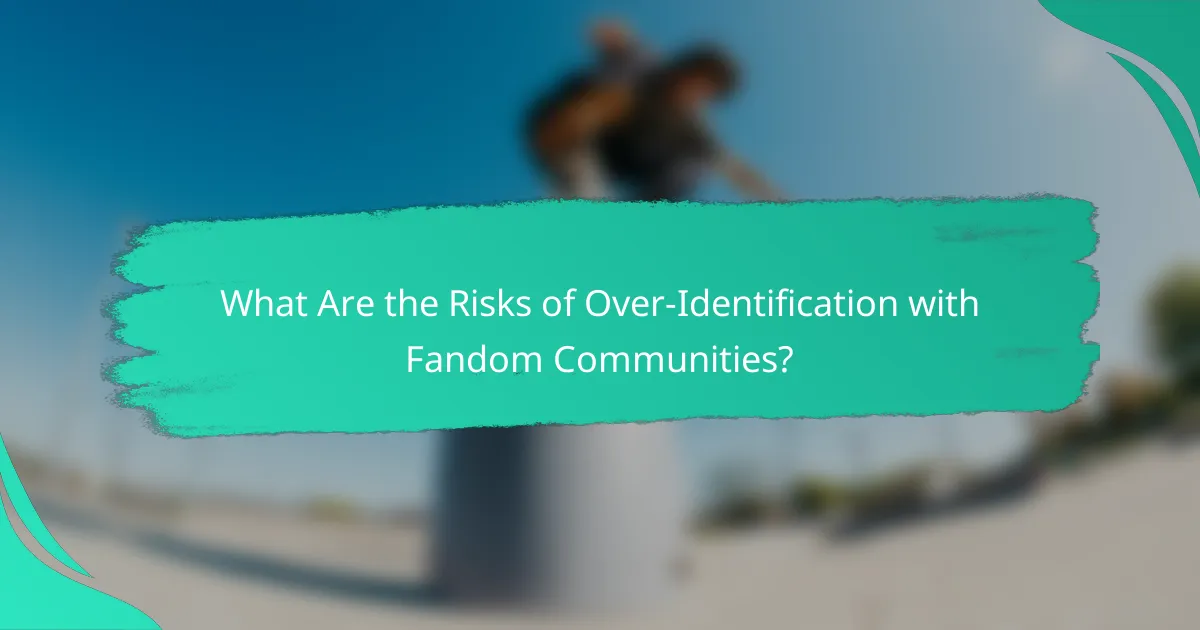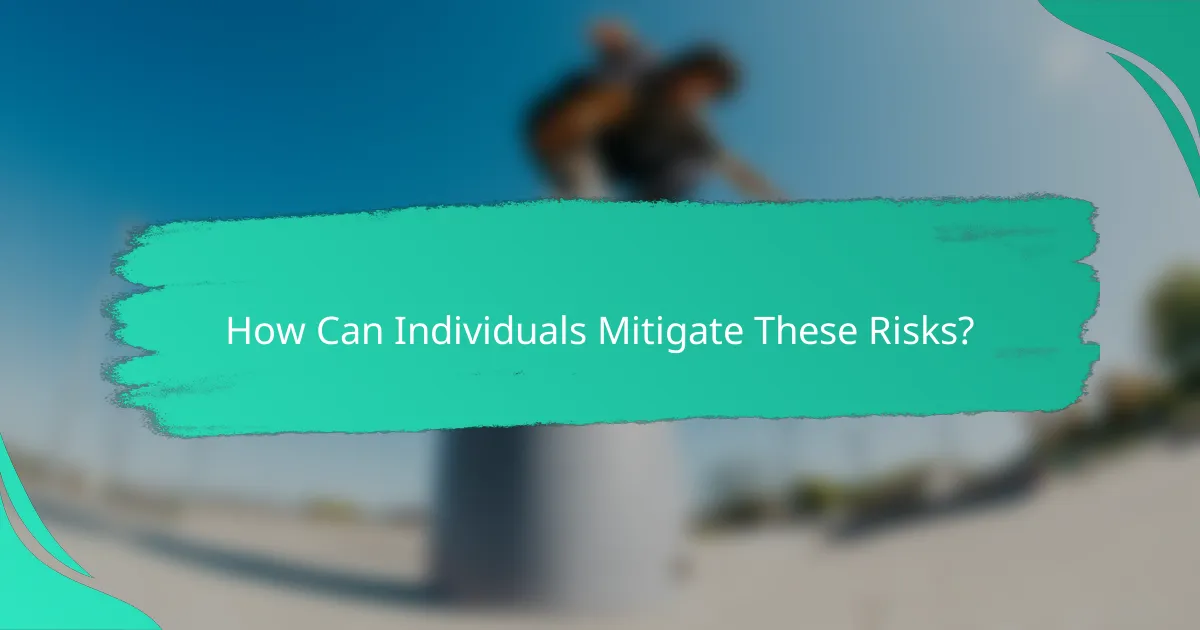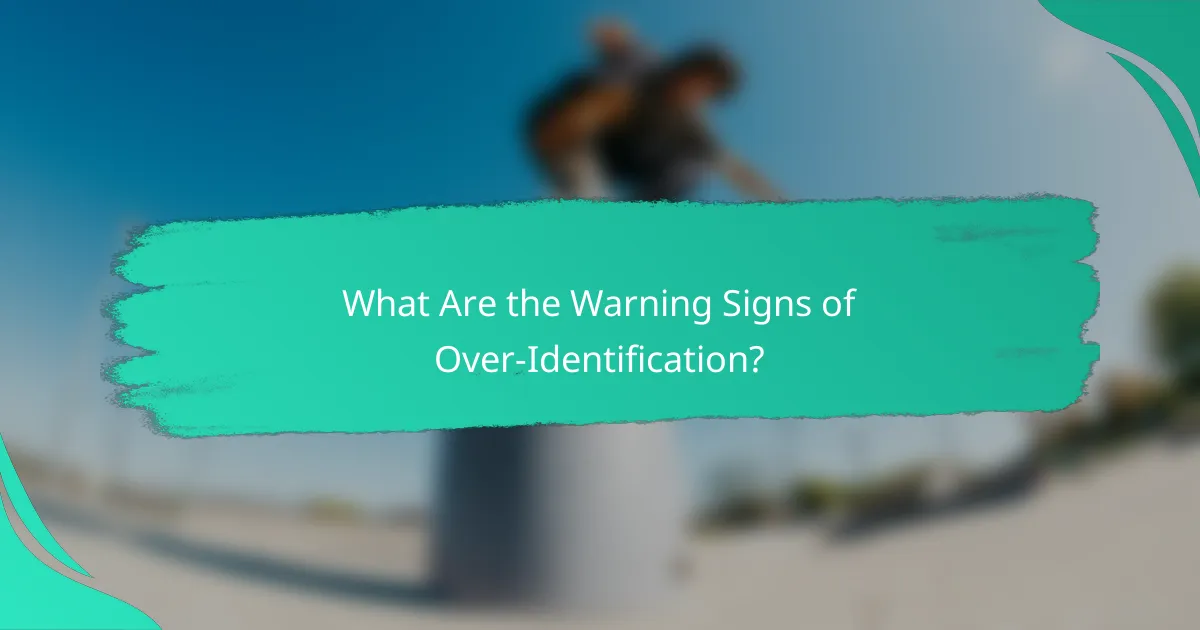Over-identification with fandom communities can pose significant risks, such as a weakened sense of personal identity and increased mental health challenges. It is essential to recognize these dangers to foster a healthier relationship with fandoms. By establishing personal boundaries and engaging in diverse interests, individuals can mitigate these risks while still enjoying the emotional support and sense of belonging that fandoms provide.

What Are the Risks of Over-Identification with Fandom Communities?
Over-identification with fandom communities can lead to several significant risks, including a diminished sense of personal identity, increased mental health issues, social isolation, and unhealthy competition among members. Understanding these risks is crucial for maintaining a balanced relationship with fandoms.
Loss of personal identity
Over-identifying with a fandom can blur the lines between personal identity and the community’s collective identity. Individuals may prioritize their fandom’s values and beliefs over their own, leading to a loss of self-awareness and personal growth.
For instance, someone who immerses themselves entirely in a fandom may adopt its norms and behaviors, neglecting their own interests and values. This can result in a lack of fulfillment and a feeling of being disconnected from one’s true self.
Increased anxiety and depression
Engagement in fandoms can sometimes exacerbate feelings of anxiety and depression, particularly if individuals feel pressure to conform or compete within the community. The constant comparison to others can lead to feelings of inadequacy and low self-esteem.
Moreover, the emotional investment in a fandom can create stress, especially during conflicts or controversies within the community. It is essential to recognize these feelings and seek support when fandom involvement negatively impacts mental health.
Social isolation
While fandoms can provide a sense of belonging, over-identification may lead to social isolation from non-fandom friends and family. Individuals may spend excessive time engaging with their fandom, neglecting real-world relationships.
This isolation can create a feedback loop where the individual feels increasingly disconnected from others, further deepening their reliance on the fandom for social interaction. Balancing fandom activities with real-life connections is vital to avoid this pitfall.
Unhealthy competition
Fandoms can foster a competitive atmosphere, where members vie for recognition or status. This competition can become unhealthy, leading to toxic behaviors such as gatekeeping or bullying within the community.
To mitigate this risk, it is important to focus on collaboration and support rather than competition. Encouraging a positive environment where all members feel valued can help reduce the negative impacts of rivalry.

How Can Individuals Mitigate These Risks?
Individuals can mitigate the risks of over-identification with fandom communities by establishing personal boundaries, engaging in diverse interests, and seeking professional support when needed. These strategies help maintain a healthy balance between fandom involvement and personal well-being.
Establish personal boundaries
Setting clear personal boundaries is essential for maintaining a healthy relationship with fandom communities. This includes defining how much time and emotional energy you are willing to invest in fandom activities, such as attending events or participating in online discussions.
Consider using a schedule to allocate specific times for fandom engagement and personal activities. For instance, limit fandom-related activities to a few hours a week to prevent them from overshadowing other important aspects of life.
Engage in diverse interests
Engaging in a variety of interests outside of fandom can help reduce the risk of over-identification. Explore hobbies, sports, or educational pursuits that stimulate different aspects of your personality and provide a well-rounded experience.
For example, if you are heavily involved in a particular fandom, try dedicating time to learning a new skill, such as cooking or painting, or participating in local community events. This diversification can enhance your overall satisfaction and reduce dependency on a single identity.
Seek professional support
If feelings of over-identification with fandom communities lead to distress or interfere with daily life, seeking professional support can be beneficial. A therapist or counselor can provide guidance and strategies to help navigate these feelings effectively.
Look for professionals who specialize in identity issues or community engagement. They can help you explore the underlying reasons for your attachment to fandom and develop healthier coping mechanisms. Consider reaching out to local mental health services or online platforms for support options.

What Role Do Fandom Communities Play in Mental Health?
Fandom communities can significantly impact mental health by providing emotional support and a sense of belonging. They create environments where individuals can connect over shared interests, which can enhance well-being and reduce feelings of isolation.
Support networks
Fandom communities often serve as vital support networks for their members. These groups can offer emotional backing during difficult times, allowing individuals to share their struggles and receive encouragement from others who understand their passions. For example, online forums or social media groups can facilitate discussions that help members cope with personal challenges.
However, it’s essential to engage with these networks mindfully. While they can provide comfort, over-reliance on fandom for emotional support may lead to neglecting real-life relationships. Balance is key; participating in fandom should complement, not replace, face-to-face interactions.
Shared experiences
Shared experiences within fandom communities foster a sense of belonging and validation. Members often bond over similar interests, such as favorite shows, books, or games, which can lead to meaningful friendships. These connections can help individuals feel less alone in their experiences, particularly for those who may struggle with mental health issues.
It’s important to recognize that while shared experiences can be uplifting, they can also lead to echo chambers where differing opinions are not welcomed. Engaging with diverse perspectives within the fandom can enhance personal growth and understanding, making the experience more enriching.

How Can Fandom Communities Foster Healthy Engagement?
Fandom communities can promote healthy engagement by creating environments that encourage open dialogue and balanced participation. This approach helps members connect positively while minimizing risks associated with over-identification.
Encourage open discussions
Open discussions are vital for fostering a sense of belonging within fandom communities. By allowing members to express their thoughts and feelings freely, communities can create a supportive atmosphere where diverse opinions are valued.
To facilitate these discussions, consider implementing regular forums or chat sessions where fans can share their perspectives. Establishing clear guidelines for respectful communication can help prevent conflicts and ensure that all voices are heard.
Promote balanced participation
Balanced participation is essential to prevent any single member or group from dominating conversations. Encourage all members to contribute by rotating discussion leaders or assigning specific topics to different participants.
Additionally, consider setting limits on how often individuals can speak in a given session to ensure everyone has the opportunity to engage. This approach not only enriches discussions but also helps maintain a healthy community dynamic.

What Are the Warning Signs of Over-Identification?
Warning signs of over-identification with fandom communities include behaviors that indicate an unhealthy attachment, such as neglecting personal relationships, spending excessive time online, and experiencing emotional distress linked to fandom activities. Recognizing these signs early can help individuals maintain a balanced lifestyle while enjoying their interests.
Neglecting personal relationships
One clear sign of over-identification is the neglect of personal relationships. If an individual prioritizes fandom activities over spending time with family and friends, it may indicate an unhealthy attachment. This can lead to feelings of isolation and loneliness, as real-world connections diminish.
To mitigate this risk, set boundaries for fandom engagement. Schedule regular time for social interactions outside of fandom, ensuring that relationships with loved ones remain strong and fulfilling.
Excessive time spent online
Spending excessive time online is another warning sign of over-identification with fandom communities. If an individual finds themselves dedicating many hours each day to online activities related to their fandom, it may interfere with daily responsibilities and personal well-being. This can lead to poor time management and decreased productivity.
To address this, consider implementing time limits for online activities. Use tools or apps to track screen time and set reminders to take breaks, ensuring a healthier balance between online and offline life.
Emotional distress linked to fandom
Emotional distress linked to fandom can manifest as anxiety, frustration, or sadness when engaging with fandom-related content. If an individual feels overwhelmed by the pressures of community expectations or experiences negative emotions tied to fandom events, it may signal over-identification. This distress can impact mental health and overall happiness.
To combat this, practice self-awareness and emotional regulation. Take breaks from fandom when feeling overwhelmed and seek support from friends or mental health professionals if needed. Engaging in diverse activities outside of fandom can also provide a healthier emotional outlet.

What Frameworks Exist for Healthy Fandom Participation?
Healthy fandom participation is supported by frameworks that promote respectful engagement and community well-being. These frameworks typically include community guidelines and access to support resources that help members navigate their involvement without over-identifying with the fandom.
Community guidelines
Community guidelines serve as a foundational element for fostering a positive environment within fandoms. They outline acceptable behaviors, encourage respectful interactions, and set clear boundaries to prevent harmful conduct. For example, guidelines may prohibit harassment, hate speech, and the sharing of personal information without consent.
When participating in a fandom, familiarize yourself with these guidelines and actively contribute to upholding them. Engaging in discussions about the guidelines can also help clarify expectations and promote a sense of shared responsibility among members.
Support resources
Support resources are essential for individuals who may struggle with their fandom involvement. These resources can include forums, hotlines, or online communities that provide emotional support and practical advice. Many fandoms have designated moderators or mental health professionals who can assist members in managing their experiences.
Utilizing support resources can help mitigate risks associated with over-identification, such as burnout or negative emotional impacts. Seek out these resources proactively, and don’t hesitate to reach out if you feel overwhelmed or need guidance on maintaining a healthy balance in your fandom activities.
